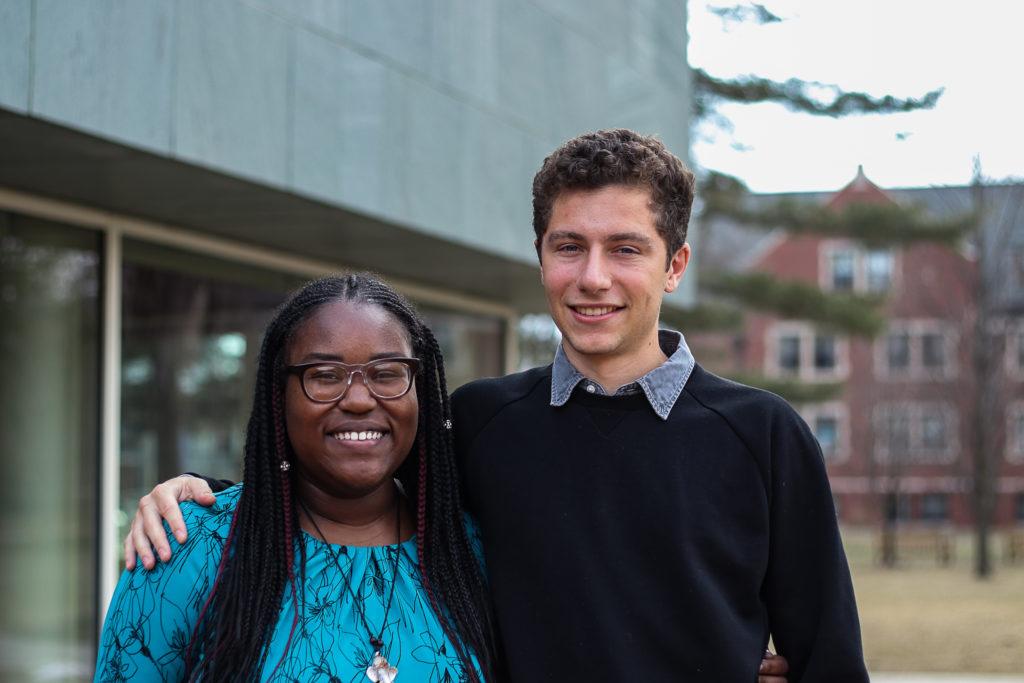Clara Larson
larsoncl@grinnell.edu

Each year, 40 students from a select group of liberal arts schools around the country are granted scholarships by the Thomas J. Watson Foundation. Watson fellows are each given $30,000 to travel internationally and explore a subject of their choice for an entire year. This year, Grinnell’s Nomalanga Shields and Artis Curiskis, both ’18, have been chosen as Watson fellows.
The Watson Fellowship is a unique opportunity in that, “it’s not a career track fellowship, and I’m not researching one specific thing,” Shields said. “It’s more so focused, not on you trying to change the world, but you trying to figure out who you are through a project that you are willing to pursue for an entire year.”
For her project, Shields will “be working with marginalized communities to see how they’re tackling housing displacement and to see how they’re also building and maintaining their sense of community while being displaced or consistently moved within the countries that they’re in.” Shields will work with the Dalit and lower caste populations in India, with the Romani population in Hungary and with native South Africans in South Africa.
Curiskis will be traveling to Russia, Georgia, India, Chile, Spain and the United Kingdom. He says that the focus of his project will be to study “unrecognized nations’ ethnic and religious minorities’ soccer teams to see how they use them as a diplomatic tool or a tool to draw attention to human rights issues as they play in unrecognized international soccer matches.”
For both Shields and Curiskis, their projects represent a convergence of their backgrounds, education and interests. Shields, a Chicago native, explained that her project was inspired by witnessing gentrification and housing displacement in Chicago, especially as they targeted low-income and African American residents. Additionally, she expressed that after her fellowship, she hopes to work in in community development, urban planning and housing development. During her time at Grinnell, she cultivated these interests through sociology classes that taught migration, statelessness and activism.
Curiskis cited his experience playing soccer for Grinnell as one of the biggest influences on his project, especially the sense of community he experienced among his team. He said that he has always been interested in doing international work, and that “every semester, I tried to take at least one culturally oriented course, because those were things that I’m interested in.” After spending a semester abroad in India where he spent time with Tibetan communities, he recognized a Tibetan national soccer team jersey hanging in a soccer shop while in Amsterdam. He explained that after this finding, his varied interests “all just kind of came together as one,” eventually inspiring a project focused on soccer community development geo-politics and human rights issues.
Both of their projects consider the implications of their topics on community development.
“It’s not a staple of the Watson, but I think the fact that both of our projects revolve around community development is kind of a testament to Grinnell and the environment, and the beliefs that brought us to this college,” Curiskis said.
This fellowship will force both Shields and Curiskis into new environments and out of their comfort zones. They both expressed worries about the language barriers they will face as they travel to new countries, especially in engaging with communities that speak predominantly local dialects. Shields added that she is also nervous about “going to places knowing that I’m going to be discriminated against for having darker skin,” and Curiskis added that he fears the isolation he may experience, as most of his time will be spent far outside of countries’ major urban centers.
Despite the fear and uncertainty that may accompany their year abroad, both Shields and Curiskis are excited for their projects and hope to grow tremendously from the experience. Curiskis cited a conversation with a previous Watson fellow in which the fellow shared that, “you don’t grow when you’re comfortable, but when you’re uncomfortable, that’s when you make the most growth.”





















































